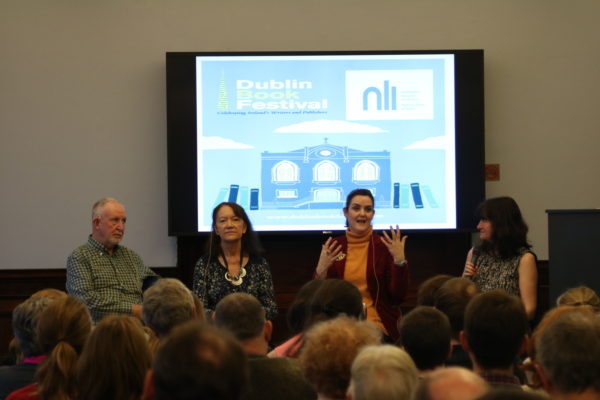
For the past five years without fail, the most popular event of Dublin Book Festival has been the Art of the Short Story. Hosted on Friday afternoon by the National Library, on the panel this year were writers Éilís Ní Dhuibhne, Nuala O’Connor and William Wall. Chaired by the documentary maker Paula Shields, the discussion opened with a question on childhood experience. “Who were your main influences?”, Shields asked. For all three writers, a love of the short story originated in the schoolroom with the short story anthology, which some of you may recall, entitled Exploring English 1. Citing literary giants such as Frank O’Connor, Seán O’Faolain, Oscar Wilde and more, the contemporary writers ground themselves in the tradition that precedes them.
“Why the short story?”, asked Shields. “Why not novels instead?” For O’Connor, it was because it is a “malleable” form with “so many gaps that you – the reader – have to do a lot of the work”. Yet short stories often suffer for being, well, short. It was a source of great frustration to O’Connor, she admitted, that publishers do not “promote short stories well”. Wall agreed but insisted that short stories have the power to “deal with ordinary lives in an extraordinary way”. Here, Ní Dhuibhne quoted Chekhov, a master of the short story: short stories “lift the veil over reality”, and so, must be read in a single sitting.
They can be written in one, too – but this is challenging. The difficulty lies in “starting over” each time, said O’Connor. When she completes one story, she feels that she will “never be able to do that again”. Ní Dhuibhne has never experienced this issue, penning stories as a student at University College Dublin. Nor is she disheartened by rejection and, even now, takes a leisurely approach, feeling no pressure to “catch people” with the first sentence. Wall and O’Connor are astounded by this, both admitting to continuously reworking their opening line. The latter explained that she has “no patience” and wants to “get in quick”. For the most part, Ní Dhuibhne empathises and urges any writers in the room to “cut their first and last paragraphs”.
This technique may not succeed in long-form literature, however, and Ní Dhuibhne acknowledged that novels are “much harder” for her. When writing her recent memoir, Twelve Thousand Days, about her husband’s life and their time together, she “broke it down into short stories” and “spaces of time”, then later combined them. This approach is not unheard of. Wall’s collection of short stories, The Islands, received great acclaim, particularly in the US, yet he soon realised that it was crying out to be revisited, to be expanded upon. This, he said, is how he came to write his novel, Grace’s Day.
Shields wonders why Ireland has quite so many short story writers: “Because it rains all the time!”, complained O’Connor, noting that we often find ourselves trapped inside “melancholic huts”. Wall, controversially, believes it is because of “our half a revolution” and finds that a “real revolution” would have spawned more novelists. But Ní Dhuibhne offers an economic explanation – short stories are easier to “write quickly” and “in your spare time”, she explained.
Notwithstanding their brevity, the ending of a short story is critical. O’Connor stressed that it should leave behind a “thinking silence”. Her peers agreed, and Wall called it “not a narrative, but a language event”. The floor then opened to audience questions and among their anxieties, of all things, lies the topic of climate change. Someone asked how the short story could possibly tackle this issue. Ní Dhuibhne expressed doubt, but O’Connor felt that “zoning in” on individual experiences offers a way forward. For Wall, ever the optimist, “as long as we have paper – or Kindles”, the short story can cope with anything.






